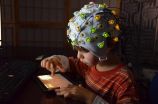(Press-News.org) Jacksonville, FL (December 19, 2014) - Investigators have found that young children with type 1 diabetes (T1D) have slower brain growth compared to children without diabetes. A new study, published in the December issue of Diabetes, now available ahead of print, suggests that continued exposure to hyperglycemia, or high blood sugars, may be detrimental to the developing brain. The research was supported by the National Institutes of Health (NIH).
"Our results show the potential vulnerability of young developing brains to abnormally elevated glucose levels, even when the diabetes duration has been relatively brief," said Nelly Mauras, MD, Chief, Division of Endocrinology, Diabetes & Metabolism at Nemours Children's Clinic in Jacksonville, Fla., and lead author of the study.
Mauras and colleagues across the Diabetes Research in Children Network (DirecNet) of five clinical pediatric diabetes centers and a coordinating center, studied brain development in children ages four to nine years old with T1D using structural magnetic resonance imaging (MRI) and cognitive tests to determine if abnormal blood glucose levels impact brain structure and function at a young age. Children with T1D also underwent blood sugar monitoring using continuous glucose sensors.
The researchers found that the brains of children with diabetes showed slower overall and regional growth of gray and white matter compared to children without diabetes. These changes were associated with higher and more variable blood sugar levels. Although there were no significant differences in cognitive function between groups at 18-months, the brain imaging results suggest that the children with T1D had differences in brain maturation compared to children without diabetes. Some of the brain regions impacted are involved in visual-spatial processing, executive functions and working memory.
"Despite the best efforts of parents and diabetes care team, about 50 percent of all blood glucose concentrations during the study were measured in the high range. Remarkably, the cognitive tests remained normal, but whether these observed changes will ultimately impact brain function will need further study," said Mauras. "As better technology develops, we hope to determine if the differences observed with brain imaging can improve with better glucose control"
"This is the thing that parents always worry about when it comes to a child with a chronic illness," study co-author Karen Winer, MD, pediatric endocrinologist at the National Institutes of Health's Eunice Kennedy Shriver National Institute of Child Health and Human Development, said in the press release. "Does it affect their brain? The good news here is that there may be some viable solutions on the horizon that parents should be aware of."
INFORMATION:
The National Institute of Child Health & Human Development (NICHD) of the NIH will be continuing to fund this research through an RO1 grant. This funding will allow the investigators to follow these same children through puberty using similar glucose monitoring, cognitive testing and MRI scans, including evaluation of brain function with functional MRI.
Nemours Children's Clinic serves as the Clinical Coordinating Center for the research. At Nemours, Dr. Mauras, co-principal investigator of the new grant, works closely with team members Kimberly Englert, RN, BSN, CDE, Kaitlin Sikes, ARNP, Allison Cato, PhD and Larry Fox, MD. Other clinical pediatric diabetes centers involved in the consortium include Stanford University, Washington University- St Louis, University of Iowa and Yale University, with the imaging and data coordinating center at Stanford University.
Nemours is an internationally recognized children's health system that owns and operates the Nemours Children's Clinic in Jacksonville, Florida, as well as the Alfred I. duPont Hospital for Children in Wilmington, Delaware and the Nemours Children's Hospital in Orlando, Florida along with pediatric specialty clinics in Delaware, Florida, Pennsylvania and New Jersey.
Established as The Nemours Foundation through the legacy and philanthropy of Alfred I. du Pont, Nemours offers pediatric clinical care, research, education, advocacy and prevention programs to all families in the communities it serves. For more information, visit http://www.Nemours.org
(MEMPHIS, Tenn. - DECEMBER 18, 2014) A study led by St. Jude Children's Research Hospital scientists has identified the population of white blood cells that tumors use to enhance growth and suppress the disease-fighting immune system. The results, which appear in the December 18 edition of the scientific journal Immunity, mark a turning point in cancer immunology and provide the foundation for developing more effective immunotherapies.
For years, researchers have known that a diverse group of white blood cells called myeloid-derived suppressor cells (MDSC) are more abundant ...
In a previous randomized controlled trial, Stanford University researchers developed two curricula for Girl Scouts to use energy more efficiently: one on energy use at home, and the other in transportation and food. Both courses were effective for girls in the short term, and the home energy course was effective for girls in the long term and for parents in the short term.
Subsequently, the Northern California Girl Scouts began disseminating the programs via manuals and reusable materials, but that method of disseminating the programs has not lead to widespread use.
On ...
[Boston, MA December18, 2014] Parents of children involved in an elementary school-based community intervention to prevent obesity appear to share in its health benefits. A new analysis of Shape Up Somerville: Eat Smart Play Hard™ shows an association between being exposed to the intervention as a parent and a modest decrease in body mass index (BMI) compared to parents in two similar control communities. The study led by researchers at the Friedman School of Nutrition Science and Policy at Tufts University and the Centers for Disease Control and Prevention (CDC) ...
University of Chicago developmental neuroscientists have found specific brain markers that predict generosity in children. Those neural markers appear to be linked to both social and moral evaluation processes.
There are many sorts of prosocial behaviors. Although young children are natural helpers, their perspective on sharing resources tends to be selfish. Jean Decety, the Irving B. Harris Professor of Psychology and Psychiatry, and Jason Cowell, a postdoctoral scholar in Decety's Child NeuroSuite lab, wanted to find out how young children's brains evaluate whether ...
Australian scientists have developed a model for oil palm cultivation, aimed at helping growers of the crop maximize the yields of their plantations, while minimizing detrimental environmental impacts.
The model was recently published in the journal Environmental Modeling & Software.
"Oil palm has become a major crop in the tropics, cultivated on more than 39 million acres of land," co-author Dr Paul Nelson of James Cook University (JCU) said.
"Demand for the product continues to grow, and the industry is expected to keep expanding in the foreseeable future.
"At ...
Scientists at A*STAR's Institute of Medical Biology (IMB) and Institute of Molecular and Cellular Biology (IMCB) have identified a genetic pathway that accounts for the extraordinary size of the human brain. The team led by Dr Bruno Reversade from A*STAR in Singapore, together with collaborators from Harvard Medical School, have identified a gene, KATNB1, as an essential component in a genetic pathway responsible for central nervous system development in humans and other animals.
By sequencing the genome of individuals of normal height but with a very small head size, ...
Here's a nice surprise: quantum physics is less complicated than we thought. An international team of researchers has proved that two peculiar features of the quantum world previously considered distinct are different manifestations of the same thing. The result is published 19 December in Nature Communications.
Patrick Coles, Jedrzej Kaniewski, and Stephanie Wehner made the breakthrough while at the Centre for Quantum Technologies at the National University of Singapore. They found that 'wave-particle duality' is simply the quantum 'uncertainty principle' in disguise, ...
Misfiring of the brain's control system might underpin compulsions in obsessive-compulsive disorder (OCD), according to researchers at the University of Cambridge, writing in the American Journal of Psychiatry.
The research, led by Dr Claire Gillan and Professor Trevor Robbins (Department of Psychology) is the latest in a series of studies from the Cambridge Behavioural and Clinical Neuroscience Institute investigating the possibility that compulsions in OCD are products of an overactive habit-system. This line of work has shifted opinion away from thinking of OCD as ...
The memory and walking speeds of adults who have lost all of their teeth decline more rapidly than in those who still have some of their own teeth, finds new UCL research.
The study, published in the Journal of the American Geriatrics Society, looked at 3,166 adults aged 60 or over from the English Longitudinal Study of Ageing (ELSA) and compared their performance in tests of memory and walking speed. The results showed that the people with none of their own teeth performed approximately 10% worse in both memory and walking speed tests than the people with teeth.
The ...
Hormone replacement therapy (HRT) is the most effective treatment for menopausal symptoms, in particular for younger women at the onset of the menopause, suggests a new review published today (19 December) in The Obstetrician & Gynaecologist (TOG).
The review highlights that menopausal symptoms, including hot flushes and night sweats are common, affecting around 70% of women for an average of 5 years but may continue for many years in about 10% of women.
Every woman experiences the menopause differently; some experience one or two symptoms mildly while others have ...


